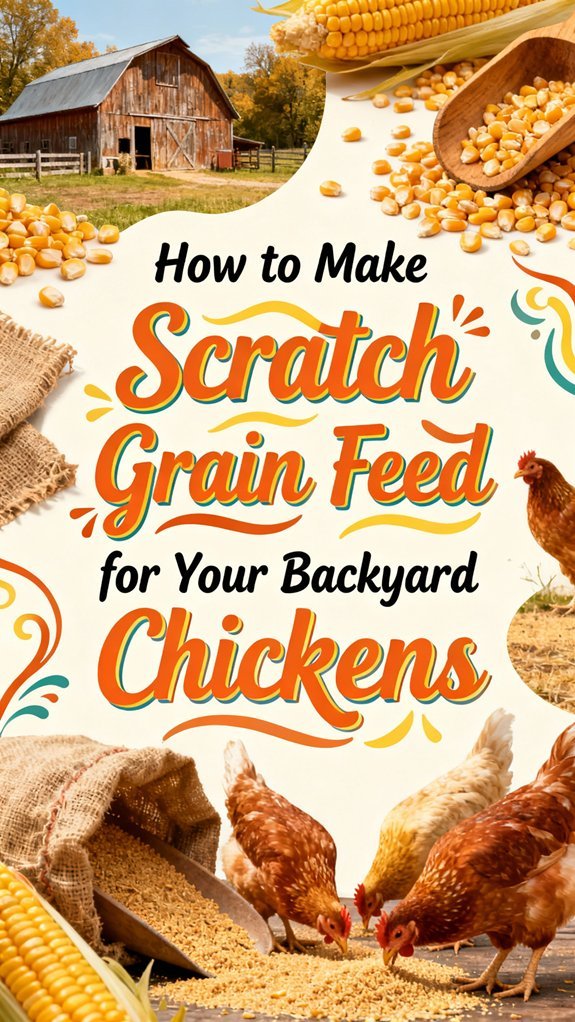You can safely feed popcorn to your chickens as an occasional treat, but you’ll need to follow specific guidelines. Only offer plain, fully popped, and completely cooled popcorn without seasonings or additives. Limit treats to 1-2 cups weekly, representing no more than 10% of their total diet, to prevent nutritional imbalances. Monitor your flock for any adverse reactions, and always provide fresh water and grit. Understanding proper serving methods and alternatives will help guarantee your chickens’ ideal health.
The Nutritional Value of Popcorn for Chickens
While popcorn may seem like an appealing treat for chickens, its nutritional profile reveals significant limitations as a feed source. The primary popcorn nutrients consist mainly of carbohydrates, with minimal protein content and negligible fat levels. You’ll find small amounts of vitamins B-6, C, and K, along with minerals like iron, manganese, and potassium, but these quantities aren’t sufficient for your chickens’ daily requirements. During the pullet stage, chickens require especially nutrient-dense foods to support their rapid development and feather growth. Similar to how fresh sage leaves provide superior nutrition compared to dried versions, fresh whole grains are generally more beneficial than processed options like popcorn.
When considering feeding frequency, you should understand that popcorn lacks essential amino acids and thorough nutrition needed for proper muscle development and overall health. While it provides quick energy through its carbohydrate content and contains some beneficial fiber for digestion, popcorn can’t replace formulated feed. It’s best reserved as an occasional treat rather than a dietary staple. For young chicks especially, starter feed should be the primary nutrition source until they reach 6 weeks of age.
Safety Guidelines for Feeding Popcorn to Your Flock
Although popcorn can serve as a treat for chickens, implementing strict safety protocols guarantees your flock’s well-being during feeding. When considering popcorn preparation, you’ll need to verify kernels are fully popped and cooled, avoiding any seasonings, butter, or additives that could harm your birds. Air-popped or homemade varieties offer the safest options.
Monitor feeding frequency carefully, limiting treats to 1-2 cups weekly to prevent nutritional imbalances. You’ll want to spread the popcorn in clean, dry areas to prevent crowding and observe your flock for any signs of distress. Remember to remove uneaten portions promptly to avoid spoilage. For peak safety, never feed unpopped kernels or microwave popcorn with chemical coatings, and confirm your birds have access to fresh water and grit to aid digestion. Since popcorn is primarily high in fiber, it can be a beneficial occasional treat when served plain and unseasoned.
Benefits and Drawbacks of Popcorn as a Chicken Treat
Feeding popcorn to your chickens presents a complex balance of nutritional benefits and potential risks. While it provides moderate protein levels, essential vitamins (B-6, C, and K), and minerals like manganese and zinc, it shouldn’t replace their primary feed. You’ll notice varied popcorn preferences among your flock, with some birds keenly consuming it while others may show less interest.
The treat can stimulate natural foraging behaviors and reduce boredom, making it valuable for environmental enrichment. Just as with nesting boxes in a well-designed coop, proper feeding areas help maintain your chickens’ overall wellbeing. However, you’ll need to manage potential drawbacks, including risks of nutritional imbalance if overfed and possible choking hazards from unpopped kernels. Remember that salt and butter can be harmful to chickens’ health. For ideal results, offer only plain, air-popped popcorn in moderation, ensuring it complements rather than compromises your chickens’ core nutritional needs.
Understanding Different Types of Popcorn for Chickens
When selecting popcorn for your chickens, understanding the distinct types and their safety implications becomes essential for responsible treat-giving. You’ll need to differentiate between unpopped kernels, which pose significant digestive risks, and popped popcorn that’s safer and more digestible. Among popcorn varieties, stick to plain, unseasoned options – yellow or white kernels work equally well once popped. Like papaya flesh treats, popcorn should be offered in moderation as part of a balanced diet.
Consider kernel digestibility when choosing forms: while adult chickens can manage small amounts of popped corn, chicks require extra caution due to their sensitive digestive systems. You’ll want to avoid all flavored varieties, including buttered, salted, or sweetened popcorn, as these contain harmful additives. For ideal safety, select organic or non-GMO popped popcorn that’s free from coatings and additional ingredients. Offering unpopped kernels can help chickens as they function like pebbles in the gizzard. For added nutrition and enrichment, consider mixing popped corn with dried mealworms to create an engaging treat that encourages natural foraging behavior.
Best Practices for Serving Popcorn to Chickens
To guarantee ideal health and safety when offering popcorn treats to chickens, you’ll need to follow several essential protocols for preparation and serving. Begin your popcorn preparation by ensuring kernels are fully popped and cooled, with no unpopped pieces that could pose choking hazards. You’ll want to serve only plain, unseasoned popcorn without butter, salt, or additives that could harm your flock.
The nutritious treat provides whole grain benefits to your chickens while being low in calories. Like all treats, ensure popcorn follows the daily treat allowance of no more than 10% of their total diet. Monitor your chickens’ preferences and reactions when introducing popcorn, limiting treats to 10-20% of their total diet. Distribute small amounts across feeding areas to prevent competition and stress. You should supervise feeding sessions to watch for any issues, and integrate popcorn with other healthy treats to maintain balanced nutrition. Remember to store treats properly in airtight containers to prevent contamination.
Health Risks and Warning Signs to Watch For
Several critical health risks demand attention when introducing popcorn into your chickens’ diet. Unpopped kernels present serious choking hazards and can cause intestinal blockages, while large popped pieces may obstruct their small throats. You’ll need to watch for signs of respiratory distress or coughing that could indicate choking. Since chickens lack natural teeth, insoluble grit helps them break down tough food particles in their gizzard. Maintaining fresh water and grit is essential for proper digestion and preventing complications.
Nutritional deficiencies can develop if popcorn exceeds 10% of daily intake, as it lacks essential proteins, vitamins, and minerals. Monitor for decreased egg production, lethargy, or changes in water consumption. Seasoned varieties pose additional risks – salt can cause dehydration and kidney damage, while butter may lead to fatty liver disease. Watch for sudden weight changes or abdominal swelling. If you notice reduced activity, loss of appetite, or diarrhea, these could signal diet-related health issues requiring immediate attention.
Alternative Treat Options for Your Backyard Chickens
Many nutritious alternatives to popcorn can provide your chickens with essential nutrients while satisfying their treat-seeking behavior. You’ll find an abundance of options in leafy greens like kale, Swiss chard, and romaine lettuce, which deliver crucial vitamins and minerals. For protein sources, consider offering cooked eggs, mealworms, or black soldier fly larvae to support feather growth and overall health. Since chickens are natural omnivores, their diet should include both plant-based and protein-rich foods.
Fresh fruits such as watermelon, berries, and apples supply natural sugars and antioxidants, while sprouted grains offer year-round nutrition. You can also incorporate vegetables like carrots, pumpkin, and cooked beans into their diet. When selecting treats, prioritize variety and nutritional value, ensuring that supplemental foods don’t exceed 10% of their daily intake to maintain proper dietary balance. Heritage breed chickens are particularly skilled at foraging for insects and plants, making them excellent at supplementing their own diet naturally. Since chickens are inherently social creatures, providing treats during interactive feeding sessions can help fulfill their need for companionship.





